Product analysts play a key role in understanding market trends and customer needs. They gather and analyze data to help companies make informed decisions about product development and marketing strategies.
Product analyst skills include proficiency in data analysis tools like SQL and Excel, as well as strong analytical thinking and communication abilities.
Candidates can write these abilities in their resumes, but you can’t verify them without on-the-job Product Analyst skill tests.
In this post, we will explore 9 essential Product Analyst skills, 11 secondary skills and how to assess them so you can make informed hiring decisions.
Table of contents
9 fundamental Product Analyst skills and traits
The best skills for Product Analysts include Data Analysis, SQL Proficiency, Statistical Analysis, A/B Testing, Market Research, Excel Mastery, Business Acumen, User Experience (UX) Understanding and Python/R Programming.
Let’s dive into the details by examining the 9 essential skills of a Product Analyst.
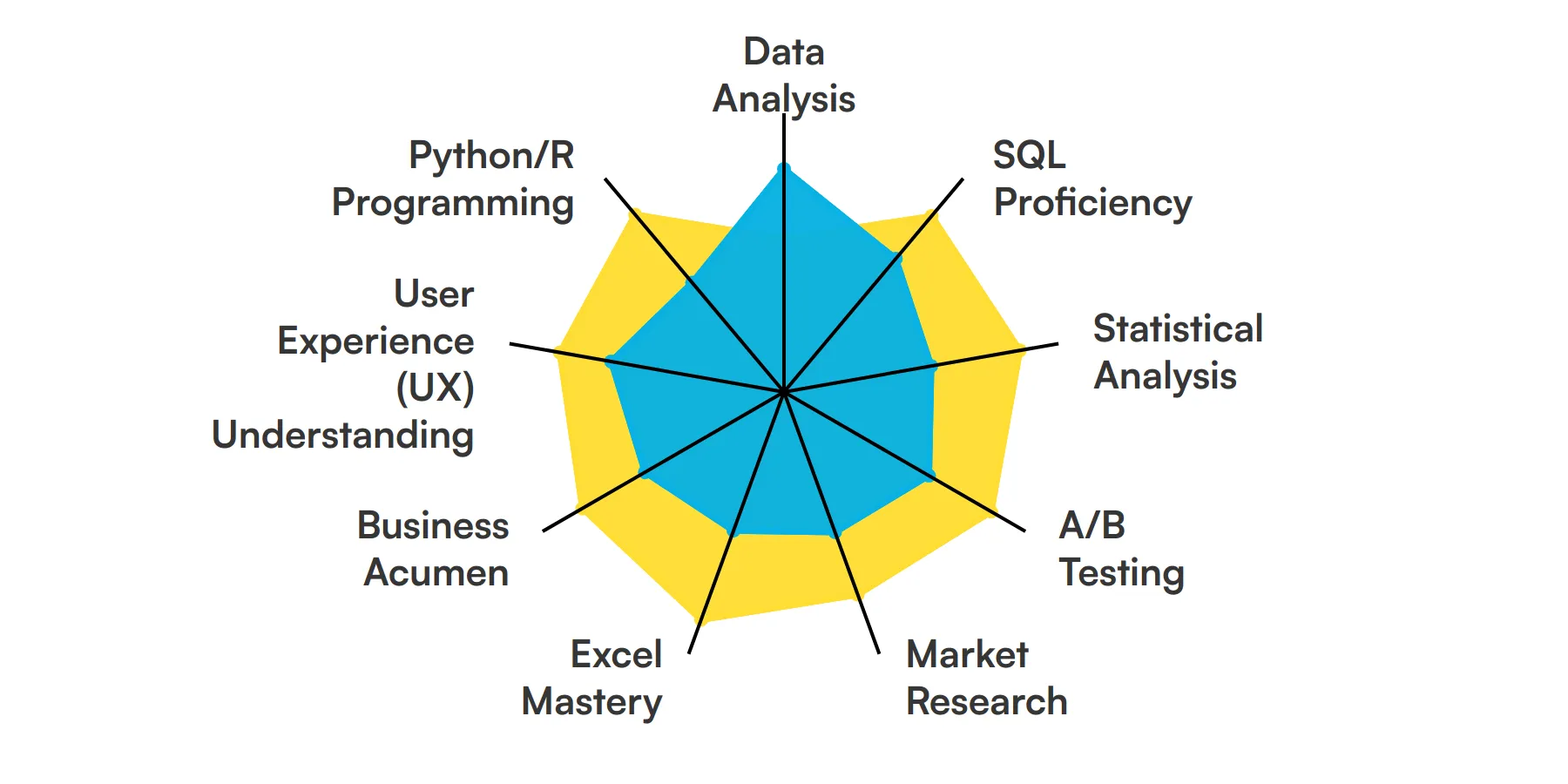
Data Analysis
Data analysis is at the core of a Product Analyst's role. It involves examining large datasets to identify trends, patterns, and insights that can inform product decisions. This skill helps in understanding user behavior and product performance.
For more insights, check out our guide to writing a Data Analyst Job Description.
SQL Proficiency
SQL proficiency is crucial for querying databases to extract relevant data. A Product Analyst uses SQL to manipulate and analyze data, which is essential for generating reports and making data-driven decisions.
Statistical Analysis
Statistical analysis involves applying statistical methods to interpret data. This skill helps a Product Analyst to validate hypotheses, understand data distributions, and make predictions about future trends.
A/B Testing
A/B testing is used to compare two versions of a product to determine which one performs better. A Product Analyst designs and analyzes these tests to optimize product features and improve user experience.
Market Research
Market research involves gathering and analyzing information about market conditions and customer preferences. This skill helps a Product Analyst to understand the competitive landscape and identify opportunities for product improvement.
Excel Mastery
Excel mastery is essential for organizing and analyzing data. A Product Analyst uses Excel for tasks such as data visualization, creating pivot tables, and performing complex calculations.
Check out our guide for a comprehensive list of interview questions.
Business Acumen
Business acumen is the ability to understand and apply business principles. A Product Analyst uses this skill to align product strategies with business goals and to make informed decisions that drive growth.
User Experience (UX) Understanding
Understanding user experience (UX) is crucial for a Product Analyst. This skill involves analyzing how users interact with a product and identifying areas for improvement to enhance user satisfaction.
For more insights, check out our guide to writing a UI/UX Designer Job Description.
Python/R Programming
Python or R programming skills are valuable for automating data analysis tasks and performing advanced statistical analysis. A Product Analyst uses these programming languages to handle large datasets and build predictive models.
11 secondary Product Analyst skills and traits
The best skills for Product Analysts include Data Visualization, Project Management, Communication Skills, Problem-Solving, Attention to Detail, Time Management, Customer Feedback Analysis, Competitive Analysis, Agile Methodologies, Presentation Skills and Data Cleaning.
Let’s dive into the details by examining the 11 secondary skills of a Product Analyst.
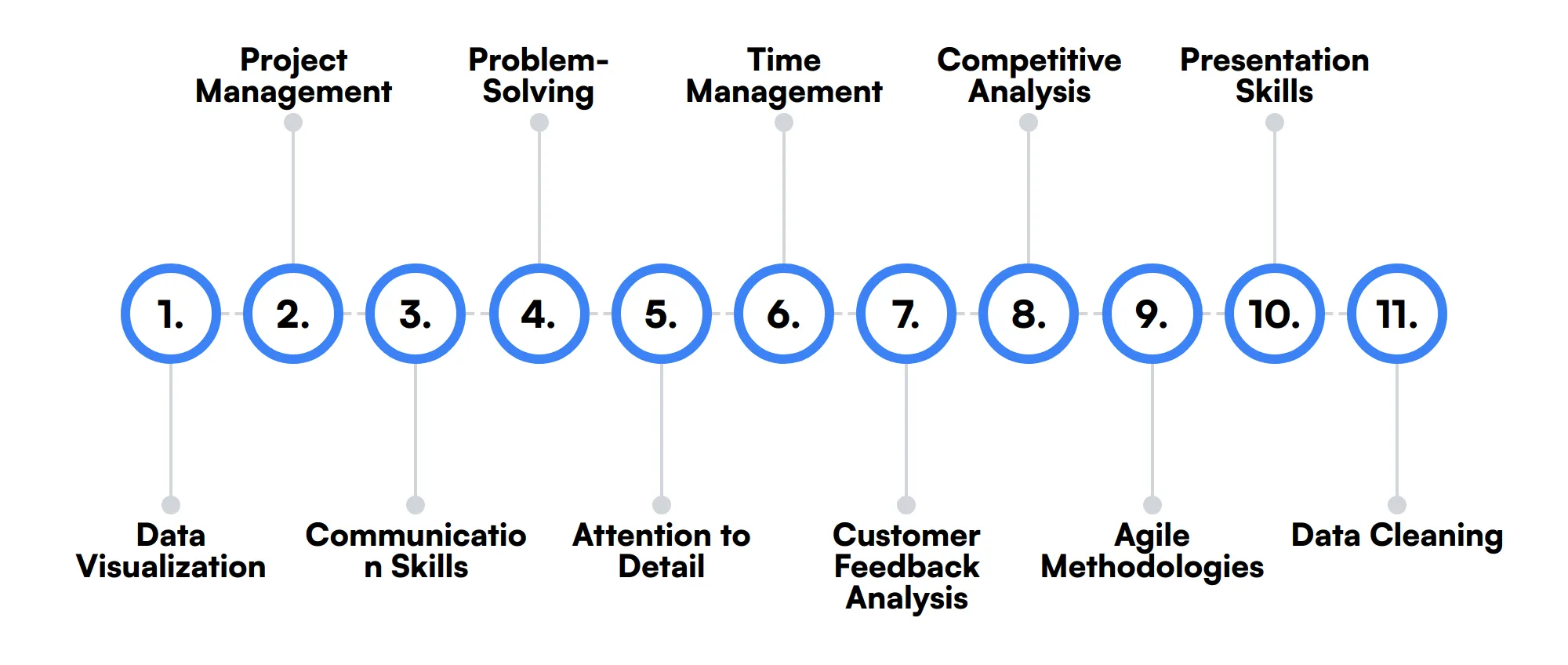
Data Visualization
Data visualization involves creating visual representations of data to communicate insights effectively. This skill helps a Product Analyst to present complex data in an easily understandable format.
Project Management
Project management skills help a Product Analyst to plan, execute, and oversee projects. This includes coordinating with different teams and ensuring that project goals are met on time.
Communication Skills
Strong communication skills are essential for conveying findings and recommendations to stakeholders. A Product Analyst needs to explain complex data insights in a clear and concise manner.
Problem-Solving
Problem-solving skills enable a Product Analyst to identify issues and develop effective solutions. This involves critical thinking and the ability to approach problems from different angles.
Attention to Detail
Attention to detail is important for ensuring data accuracy and quality. A Product Analyst must meticulously check data and analyses to avoid errors that could impact decision-making.
Time Management
Time management skills help a Product Analyst to prioritize tasks and manage multiple projects simultaneously. This ensures that deadlines are met and work is completed efficiently.
Customer Feedback Analysis
Analyzing customer feedback involves interpreting qualitative data from user reviews, surveys, and other sources. This skill helps a Product Analyst to understand user needs and improve product features.
Competitive Analysis
Competitive analysis involves researching and evaluating competitors' products and strategies. A Product Analyst uses this information to identify market trends and opportunities for differentiation.
Agile Methodologies
Familiarity with agile methodologies helps a Product Analyst to work effectively in agile development environments. This includes understanding sprint planning, backlog management, and iterative development.
Presentation Skills
Presentation skills are important for sharing insights and recommendations with stakeholders. A Product Analyst needs to create compelling presentations that highlight key findings and drive action.
Data Cleaning
Data cleaning involves preparing raw data for analysis by removing errors and inconsistencies. This skill ensures that the data used by a Product Analyst is accurate and reliable.
How to assess Product Analyst skills and traits
Assessing the skills and traits of a Product Analyst involves more than just glancing at a resume. It requires a deep dive into their ability to handle data, understand market dynamics, and use technical tools effectively. A comprehensive evaluation ensures that the candidate not only fits the technical requirements but also aligns with the strategic goals of your business.
To accurately gauge a Product Analyst's proficiency in areas like SQL, Python/R programming, and statistical analysis, practical assessments are key. These assessments allow you to see candidates in action, solving real-world problems that they would face on the job. For instance, setting up scenarios that require the use of Excel to manipulate large datasets or conducting mock A/B tests can provide insights into their analytical thinking and problem-solving skills.
Moreover, tools like Adaface assessments can streamline the screening process, offering tailored tests that cover a wide range of skills from market research to user experience understanding. By integrating these tests, companies have reported an 85% reduction in screening time, making it easier and quicker to identify top talent.
Let’s look at how to assess Product Analyst skills with these 6 talent assessments.
Data Analysis Test
Our Data Analysis Test assesses a candidate's ability to handle, modify, analyze, and interpret data. This test is designed to screen for experience with analyzing data to find possible outcomes, detect anomalies, extract meaningful insights, project estimates, and visualize data using charts and graphs.
The test evaluates skills in data modelling, business analysis fundamentals, data interpretation, and SQL. Candidates will face scenario-based MCQs that cover data analysis, business analysis, data interpretation, and SQL queries. The test is customized according to your job description to ensure relevance.
Successful candidates demonstrate proficiency in data operations, investigations, and the use of popular data tools like Excel. They can interpret charts and graphs, perform data queries, and understand business analysis fundamentals.

SQL Online Test
Our SQL Online Test evaluates a candidate's ability to design and build relational databases and tables from scratch. It also assesses their skills in applying CRUD operations, writing efficient queries, and creating indexes for faster SQL queries.
The test covers creating and deleting tables, joins and subqueries, conditional expressions, and views. Candidates will navigate through realistic scenarios involving databases, requiring them to sort data and exclude irrelevant entries cleanly and quickly.
High-scoring candidates show proficiency in handling locks and transactions, using string and mathematical functions, and ensuring database scale and security.

Statistics Test
Our Statistics Online Test evaluates a candidate's understanding and proficiency in statistical concepts and analysis. It covers topics such as statistical methods, data analysis, numerical reasoning, and quantitative aptitude.
The test assesses knowledge in statistics fundamentals, inference, data sampling, and regression. Candidates will face questions on statistical methods, probability, and exploratory data analysis.
Successful candidates demonstrate a strong grasp of non-parametric statistics, sampling distributions, and the ability to perform data analysis.
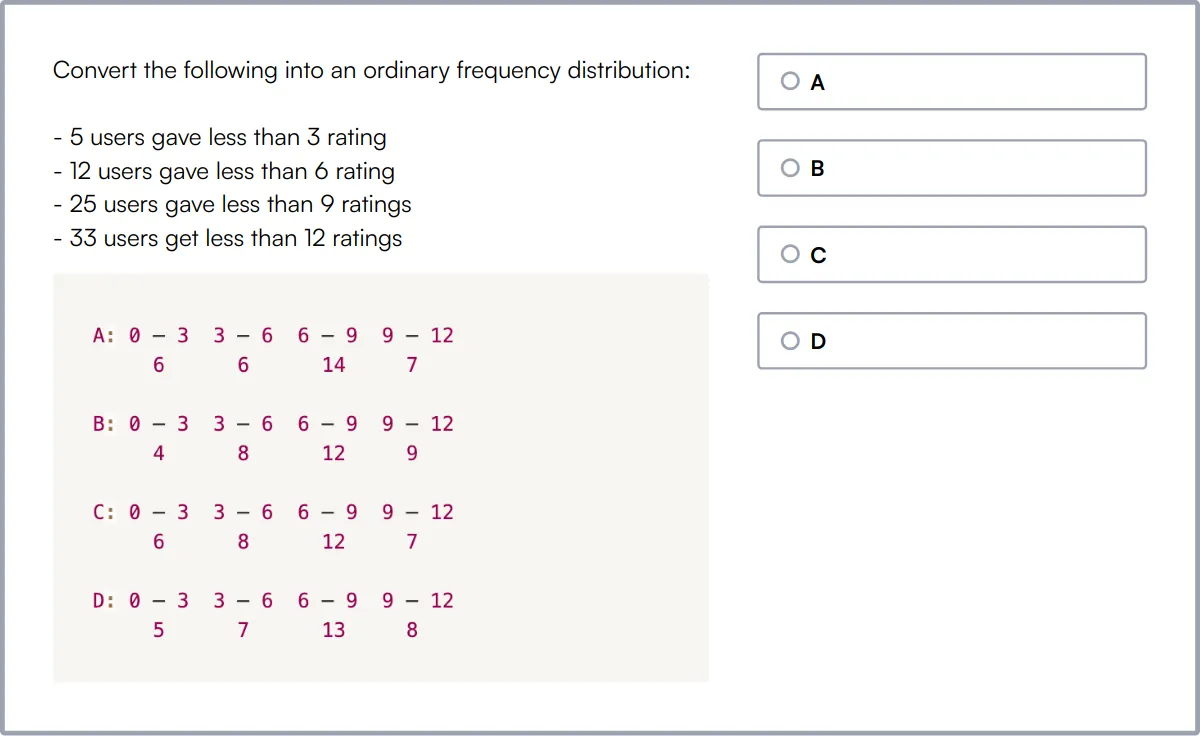
A/B Testing Test
Our A/B Testing Test assesses a candidate's knowledge of A/B testing methodologies and their ability to analyze and interpret data to make data-driven decisions. It evaluates their understanding of statistical concepts, experimental design, hypothesis testing, and data analysis techniques.
The test covers designing A/B tests, data analysis, A/B testing integrations, and web applications. Candidates will be tested on their ability to design experiments, analyze results, and interpret data to optimize conversions.
High-scoring candidates show proficiency in understanding A/B testing conversions and applying statistical methods to real-world scenarios.
Market Research Test
Our Market Research Test evaluates a candidate's knowledge and skills in market research techniques, data analysis, quantitative aptitude, business intelligence, and marketing aptitude.
The test assesses skills in market research, data analysis, market analysis, and data interpretation. Candidates will face questions on market research techniques, data analysis, and business intelligence.
Successful candidates demonstrate a strong understanding of market analysis, data interpretation, and the ability to apply quantitative aptitude to real-world marketing scenarios.
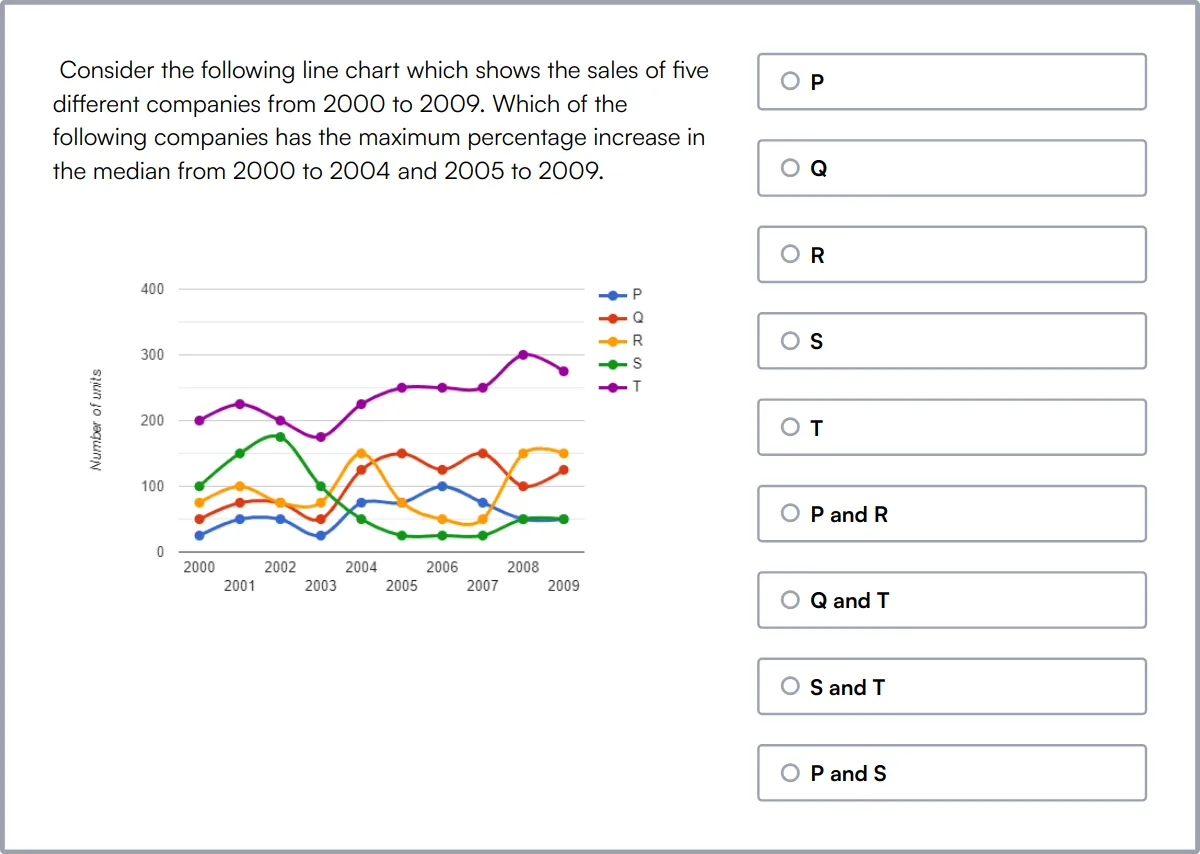
Excel Test
Our Excel Test uses scenario-based MCQ questions to evaluate a candidate's ability to work with large datasets in Excel, navigate multiple spreadsheets, use advanced formulas, and create reports.
The test covers basic and advanced formulas, data types, analyzing data, and visualizing data. Candidates will be tested on their ability to sort/filter data, analyze data using PivotTables, create dashboards using charts, and automate tasks with macros.
High-scoring candidates show proficiency in error handling, data validation, and using user form controls to enhance data management and reporting.
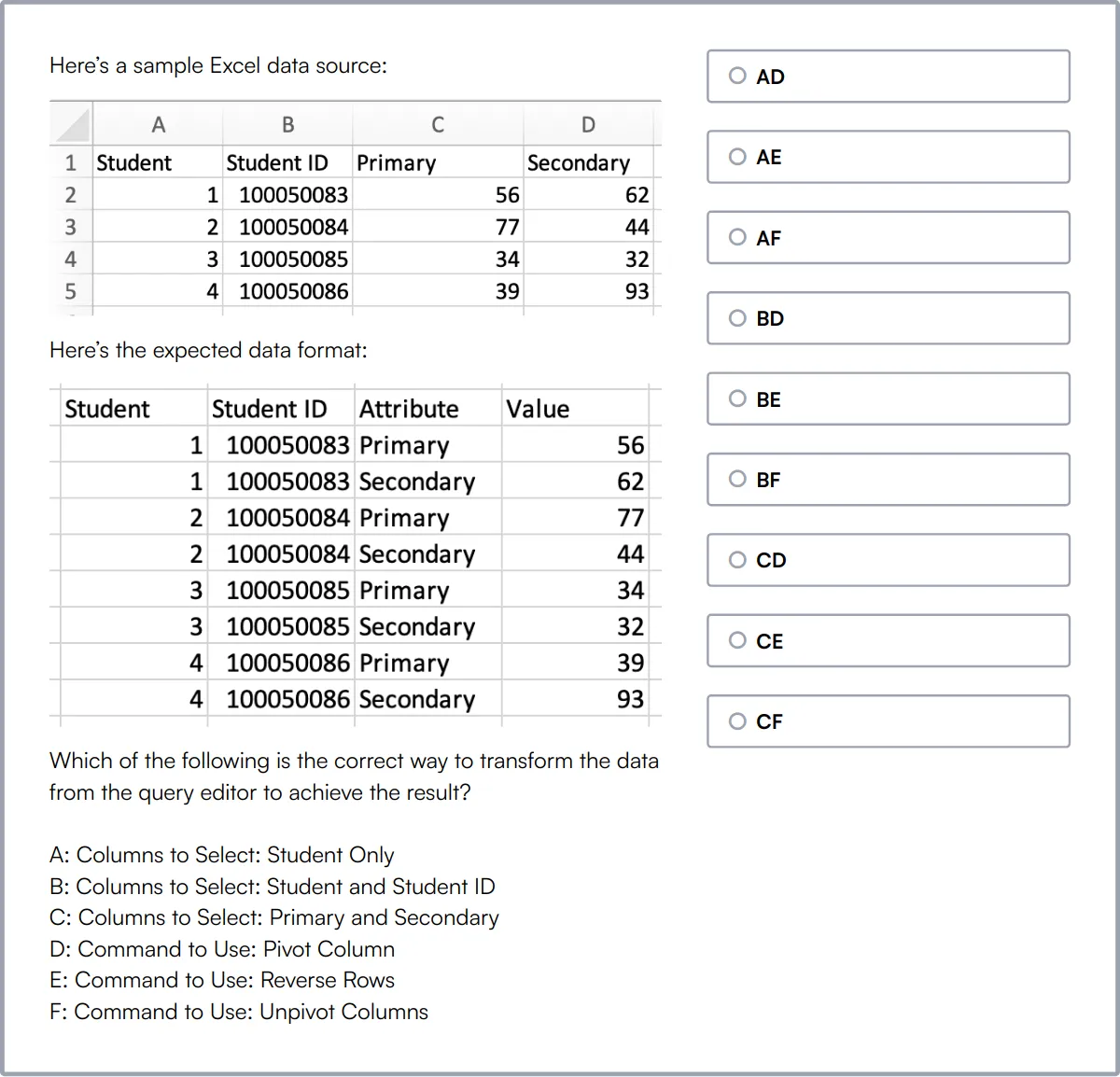
Summary: The 9 key Product Analyst skills and how to test for them
| Product Analyst skill | How to assess them |
|---|---|
| 1. Data Analysis | Evaluate ability to interpret and derive insights from data sets. |
| 2. SQL Proficiency | Test skills in querying and managing relational databases. |
| 3. Statistical Analysis | Assess understanding of statistical methods and their application. |
| 4. A/B Testing | Check capability to design and analyze controlled experiments. |
| 5. Market Research | Gauge skills in gathering and analyzing market data. |
| 6. Excel Mastery | Measure proficiency in using Excel for data manipulation and analysis. |
| 7. Business Acumen | Evaluate understanding of business operations and strategy. |
| 8. User Experience (UX) Understanding | Assess knowledge of user-centered design principles. |
| 9. Python/R Programming | Test ability to use programming languages for data analysis. |
AI Product Manager Test
Product Analyst skills FAQs
What are the key skills required for a Product Analyst role?
Key skills include Data Analysis, SQL Proficiency, Statistical Analysis, A/B Testing, Market Research, Excel Mastery, Business Acumen, and User Experience (UX) Understanding.
How can I assess a candidate's SQL proficiency?
You can assess SQL proficiency through technical tests, coding challenges, or by asking candidates to write and explain SQL queries during the interview.
Why is Python or R programming important for a Product Analyst?
Python or R is important for data manipulation, statistical analysis, and creating data visualizations, which are essential tasks for a Product Analyst.
What methods can be used to evaluate a candidate's data analysis skills?
Evaluate data analysis skills through case studies, practical tests, and by reviewing past projects or work samples that demonstrate their analytical capabilities.
How do you test a candidate's ability to perform A/B testing?
Ask candidates to design an A/B test scenario, interpret results from a sample dataset, or discuss their experience with A/B testing in previous roles.
What is the importance of business acumen in a Product Analyst role?
Business acumen helps Product Analysts understand market trends, customer needs, and business objectives, enabling them to make data-driven decisions that align with company goals.
How can communication skills be assessed for a Product Analyst?
Assess communication skills through behavioral interview questions, presentation tasks, and by evaluating their ability to explain complex data insights clearly and concisely.
What tools can be used to evaluate a candidate's data visualization skills?
Tools like Tableau, Power BI, or even Excel can be used to assess data visualization skills. Ask candidates to create visual reports or dashboards based on sample data.

40 min skill tests.
No trick questions.
Accurate shortlisting.
We make it easy for you to find the best candidates in your pipeline with a 40 min skills test.
Try for freeRelated posts
Free resources



